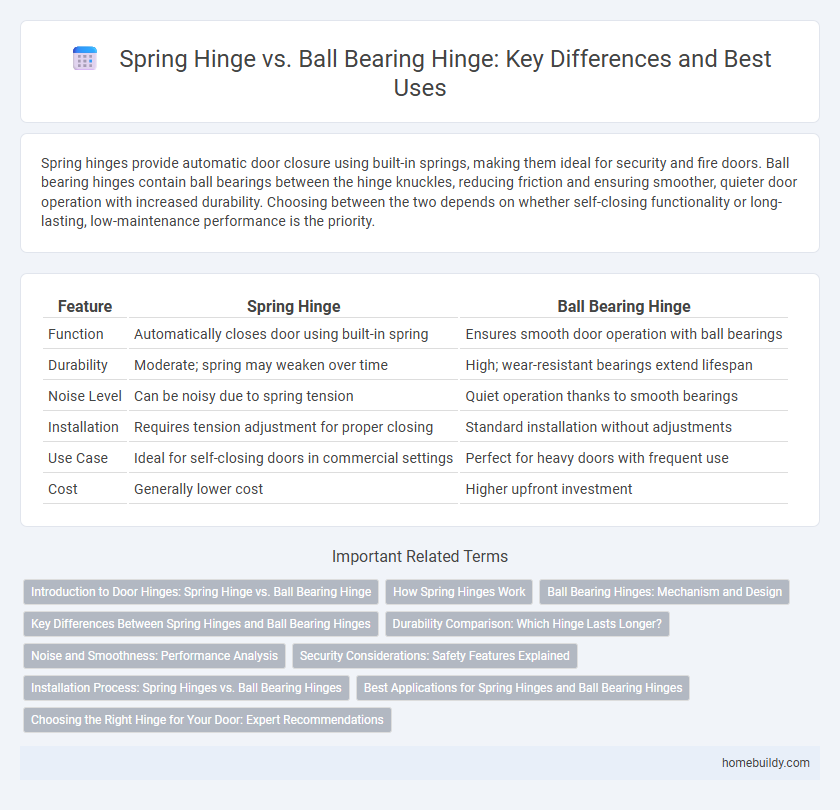Spring hinges provide automatic door closure using built-in springs, making them ideal for security and fire doors. Ball bearing hinges contain ball bearings between the hinge knuckles, reducing friction and ensuring smoother, quieter door operation with increased durability. Choosing between the two depends on whether self-closing functionality or long-lasting, low-maintenance performance is the priority.
Table of Comparison
| Feature | Spring Hinge | Ball Bearing Hinge |
|---|---|---|
| Function | Automatically closes door using built-in spring | Ensures smooth door operation with ball bearings |
| Durability | Moderate; spring may weaken over time | High; wear-resistant bearings extend lifespan |
| Noise Level | Can be noisy due to spring tension | Quiet operation thanks to smooth bearings |
| Installation | Requires tension adjustment for proper closing | Standard installation without adjustments |
| Use Case | Ideal for self-closing doors in commercial settings | Perfect for heavy doors with frequent use |
| Cost | Generally lower cost | Higher upfront investment |
Introduction to Door Hinges: Spring Hinge vs. Ball Bearing Hinge
Spring hinges use an internal coil spring to automatically close doors, providing self-closing functionality for convenience and security. Ball bearing hinges contain lubricated steel ball bearings between the hinge knuckles, which reduce friction and enable smoother, quieter operation under heavy use. Both hinge types offer durability, but spring hinges excel in hands-free closure while ball bearing hinges are preferred for heavy, frequently used doors requiring long-lasting performance.
How Spring Hinges Work
Spring hinges operate through a built-in spring mechanism that automatically closes the door after it has been opened, ensuring consistent door positioning and security. Unlike ball bearing hinges, which reduce friction for smoother door movement, spring hinges use tension from a coiled spring to provide automatic closure. This tension can often be adjusted to control the door's closing speed and force, making spring hinges ideal for self-closing applications in both residential and commercial settings.
Ball Bearing Hinges: Mechanism and Design
Ball bearing hinges feature a mechanism where steel balls are placed between the hinge knuckles, reducing friction and allowing smoother door operation compared to spring hinges. Their design supports heavy doors and frequent use by distributing weight evenly, enhancing durability and preventing wear. These hinges are ideal for high-traffic areas requiring robust performance and minimal maintenance.
Key Differences Between Spring Hinges and Ball Bearing Hinges
Spring hinges feature an internal spring mechanism that automatically closes doors, making them ideal for self-closing applications in commercial and residential settings. Ball bearing hinges incorporate lubricated ball bearings between the knuckles to reduce friction and enhance durability, which is essential for heavy doors or high-traffic areas. The primary difference lies in the function: spring hinges provide automatic door closure, while ball bearing hinges focus on smooth operation and long-term wear resistance.
Durability Comparison: Which Hinge Lasts Longer?
Spring hinges and ball bearing hinges differ significantly in durability, with ball bearing hinges generally lasting longer due to their superior construction that reduces friction between moving parts. Ball bearing hinges incorporate steel bearings that provide smoother operation and enhanced resistance to wear, making them ideal for heavy doors and high-traffic areas. Spring hinges, while functional for automatic door closure, tend to wear out faster under constant tension and are less suited for heavy-duty applications.
Noise and Smoothness: Performance Analysis
Spring hinges can generate noticeable noise due to the metal stress and tension involved, impacting the door's smooth operation. Ball bearing hinges utilize precision steel bearings to reduce friction, ensuring quieter and smoother movement over time. For applications demanding minimal noise and enhanced durability, ball bearing hinges outperform spring hinges in both performance and user experience.
Security Considerations: Safety Features Explained
Spring hinges provide controlled door closure but may pose security risks if not properly adjusted, as they can be manipulated to force entry. Ball bearing hinges enhance security by offering increased durability and resistance to tampering, reducing vulnerability to pry attacks. Incorporating ball bearing hinges in security-sensitive installations ensures improved door stability and safer, more secure environments.
Installation Process: Spring Hinges vs. Ball Bearing Hinges
Spring hinges require precise tension adjustment during installation to ensure proper door closure, often involving winding screws or rods for optimal spring compression. Ball bearing hinges are installed similarly to standard hinges but feature integrated ball bearings to reduce friction and provide smoother operation over time. While spring hinges demand careful calibration to prevent door slamming or lingering, ball bearing hinges prioritize durability and ease of installation with minimal tension adjustments.
Best Applications for Spring Hinges and Ball Bearing Hinges
Spring hinges excel in applications requiring self-closing doors such as residential entryways, fire-rated doors, and commercial restroom doors, where automatic closure ensures security and energy efficiency. Ball bearing hinges are ideal for heavy or high-traffic doors like commercial, industrial, and institutional settings, providing smooth operation and durability by reducing friction and wear over time. Selecting between spring hinges and ball bearing hinges depends on door weight, frequency of use, and the need for automatic closing versus enhanced load handling.
Choosing the Right Hinge for Your Door: Expert Recommendations
Spring hinges provide self-closing functionality ideal for fire doors and security applications, while ball bearing hinges offer superior durability and smooth operation for high-traffic interior or exterior doors. Experts recommend selecting spring hinges for convenience in automatically closing doors, ensuring safety and energy efficiency, whereas ball bearing hinges are preferred for heavy or frequently used doors that require long-lasting performance. Consider door weight, frequency of use, and desired closing mechanisms when choosing between spring hinges and ball bearing hinges to optimize door functionality.
spring hinge vs ball bearing hinge Infographic

 homebuildy.com
homebuildy.com